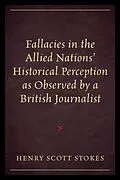In 1941, Imperial Japan rapidly brought an end to the British Empire in Asia. Because a non-white race dared to upset the white colonialists' status quo in Asia, the British resented the Japanese long after the war. Mr. Henry Scott-Stokes states that he held such a view as well before arriving in Japan as a foreign correspondent. Mr. Scott-Stokes writes of his transformation, of uncritical acceptance of the western colonialist's version of the Greater East Asian War, the so-called Pacific War, to realization of its absolute vacuousness. "[The Japanese]," he states, "were supposed to simply accept, without any criticism or opposition whatsoever, the noble wisdom of civilization [the verdicts of the Tokyo Trials]."
Mindless parroting of historical fabrications by modern Japanese suggests a loss of national consciousness, of what it means to be Japanese, as Yukio Mishima expressed in his discussions with Mr. Scott-Stokes. Japan lost her independence to America and is merely a protectorate and not a nation with her own culture and history. Japanese people need to take it upon themselves to change this situation. Mr. Stokes' mother-in-law, however, wryly commented that today's Japanese are cowards, so it will take another 200 or 300 years.
Autorentext
Henry Scott Stokes was born in England in 1938. After earning an undergraduate degree from Oxford University, he joined the Financial Times, Inc. He became Tokyo Bureau Chief of The Times and became Tokyo Bureau Chief of TheNew York Times. He is the author of The Life and Death of Yukio Mishima (Farrar, Straus and Giroux Inc., New York).
Inhalt
Foreword
Introduction
Chapter One: US Army Tanks in England, My Homeland
Chapter Two: Is Japan the Only Country That Committed War Crimes?
Chapter Three: What Was the Objective of Yukio Mishima's Suicide?
Chapter Four: Osaka City Mayor Toru Hashimoto's Press Conference and the "Comfort Women" Issue
Chapter Five: Chiang Kai-shek and Mao Zedong Silent About "Nanking Massacre"
Chapter Six: What Was the Meaning of Voices of the Heroic Dead?
Chapter Seven: Japan as the Light of Hope for Asia
Chapter Eight: Asian Leaders I Have Met
Chapter Nine: Memorable People
Chapter Ten: People of Japan, Take Pride in Your History
